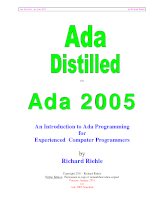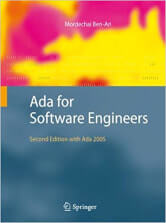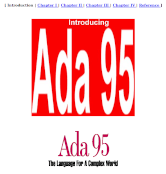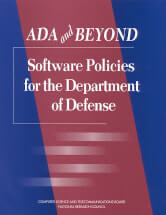5. Ada Distilled by Richard Riehle
 Ada Distilled is an introduction to Ada programming for experienced computer programmers.
Ada Distilled is an introduction to Ada programming for experienced computer programmers.
This is not a “…for dummies” book, nor is it intended as a program design book.
Instead, the author highlights some key features of the Ada language, with coded examples, that are essential for getting started as an Ada programmer.
6. Ada for Software Engineers by M. Ben-Ari

As the title implies, this book is for you if you are a software engineer or training to become one.
The book is intended for software engineers making the transition to Ada, and for upper-level undergraduate and graduate students (including those who have had the good fortune to study Ada as their first programming language!)
No specific Ada knowledge is assumed; the prerequisites are a basic knowledge of computer science and computer systems, and significant programming experience (not necessarily in Ada).
7. Introducing Ada 95 – The Language for a Complex World by John Barnes
 This book contains four chapters.
This book contains four chapters.
Chapter 1 gives the background to the development process including the capture of the requirements from the existing and future user community.
Chapter 2 introduces the highlights of the language, especially the three topics mentioned above, Objected Oriented Programming, Hierarchical Libraries and Protected Objects; it is in a tutorial style.
Chapter 3 gives an overview of the whole language showing how the new facilities fit into the overall framework.
Finally, Chapter 4 addresses the issue of upward compatibility with Ada 83 and shows that for normal programs the goal of compatibility has been achieved. This document will be of special value to program managers, team leaders and all software professionals with concern for the organized development of software.
8. Ada and Beyond: Software Policies for the Department of Defense by National Research Council
 This book presents an approach for the DOD to move beyond the debate over its policy that requires the use of Ada for all new software development.
This book presents an approach for the DOD to move beyond the debate over its policy that requires the use of Ada for all new software development.
It describes the importance of the software engineering process and recommends to DOD mechanisms for more effective review of software development and improved collection of data on software project outcomes.
The book also analyzes the technical, empirical, and business cases for using Ada and other programming languages, makes recommendations regarding the appropriate conditions under which DOD should continue to require the use of Ada, and details activities that require funding by DOD in order for Ada to remain a viable programming language.
Next page: Page 3 – SPARK Ada for the MISRA-C Developer and more books
Pages in this article:
Page 1 – Ada 95: The Lovelace Tutorial and more books
Page 2 – Ada Distilled and more books
Page 3 – SPARK Ada for the MISRA-C Developer and more books
All books in this series:
| Free Programming Books | |
|---|---|
| Ada | ALGOL-like programming language, extended from Pascal and other languages |
| Agda | Dependently typed functional language based on intuitionistic Type Theory |
| Arduino | Inexpensive, flexible, open source microcontroller platform |
| Assembly | As close to writing machine code without writing in pure hexadecimal |
| Awk | Versatile language designed for pattern scanning and processing language |
| Bash | Shell and command language; popular both as a shell and a scripting language |
| BASIC | Beginner’s All-purpose Symbolic Instruction Code |
| C | General-purpose, procedural, portable, high-level language |
| C++ | General-purpose, portable, free-form, multi-paradigm language |
| C# | Combines the power and flexibility of C++ with the simplicity of Visual Basic |
| Clojure | Dialect of the Lisp programming language |
| ClojureScript | Compiler for Clojure that targets JavaScript |
| COBOL | Common Business-Oriented Language |
| CoffeeScript | Transcompiles into JavaScript inspired by Ruby, Python and Haskell |
| Coq | Dependently typed language similar to Agda, Idris, F* and others |
| Crystal | General-purpose, concurrent, multi-paradigm, object-oriented language |
| CSS | CSS (Cascading Style Sheets) specifies a web page’s appearance |
| D | General-purpose systems programming language with a C-like syntax |
| Dart | Client-optimized language for fast apps on multiple platforms |
| Dylan | Multi-paradigm language supporting functional and object-oriented coding |
| ECMAScript | Best known as the language embedded in web browsers |
| Eiffel | Object-oriented language designed by Bertrand Meyer |
| Elixir | Relatively new functional language running on the Erlang virtual machine |
| Erlang | General-purpose, concurrent, declarative, functional language |
| F# | Uses functional, imperative, and object-oriented programming methods |
| Factor | Dynamic stack-based programming language |
| Forth | Imperative stack-based programming language |
| Fortran | The first high-level language, using the first compiler |
| Go | Compiled, statically typed programming language |
| Groovy | Powerful, optionally typed and dynamic language |
| Haskell | Standardized, general-purpose, polymorphically, statically typed language |
| HTML | HyperText Markup Language |
| Icon | Wide variety of features for processing and presenting symbolic data |
| J | Array programming language based primarily on APL |
| Java | General-purpose, concurrent, class-based, object-oriented, high-level language |
| JavaScript | Interpreted, prototype-based, scripting language |
| Julia | High-level, high-performance language for technical computing |
| Kotlin | More modern version of Java |
| LabVIEW | Designed to enable domain experts to build power systems quickly |
| LaTeX | Professional document preparation system and document markup language |
| Lisp | Unique features - excellent to study programming constructs |
| Logo | Dialect of Lisp that features interactivity, modularity, extensibility |
| Lua | Designed as an embeddable scripting language |
| Markdown | Plain text formatting syntax designed to be easy-to-read and easy-to-write |
| Objective-C | Object-oriented language that adds Smalltalk-style messaging to C |
| OCaml | The main implementation of the Caml language |
| Pascal | Imperative and procedural language designed in the late 1960s |
| Perl | High-level, general-purpose, interpreted, scripting, dynamic language |
| PHP | PHP has been at the helm of the web for many years |
| PostScript | Interpreted, stack-based and Turing complete language |
| Prolog | A general purpose, declarative, logic programming language |
| PureScript | Small strongly, statically typed language compiling to JavaScript |
| Python | General-purpose, structured, powerful language |
| QML | Hierarchical declarative language for user interface layout - JSON-like syntax |
| R | De facto standard among statisticians and data analysts |
| Racket | General-purpose, object-oriented, multi-paradigm, functional language |
| Raku | Member of the Perl family of programming languages |
| Ruby | General purpose, scripting, structured, flexible, fully object-oriented language |
| Rust | Ideal for systems, embedded, and other performance critical code |
| Scala | Modern, object-functional, multi-paradigm, Java-based language |
| Scheme | A general-purpose, functional language descended from Lisp and Algol |
| Scratch | Visual programming language designed for 8-16 year-old children |
| SQL | Access and manipulate data held in a relational database management system |
| Standard ML | General-purpose functional language characterized as "Lisp with types" |
| Swift | Powerful and intuitive general-purpose programming language |
| Tcl | Dynamic language based on concepts of Lisp, C, and Unix shells |
| TeX | Markup and programming language - create professional quality typeset text |
| TypeScript | Strict syntactical superset of JavaScript adding optional static typing |
| Vala | Object-oriented language, syntactically similar to C# |
| VHDL | Hardware description language used in electronic design automation |
| VimL | Powerful scripting language of the Vim editor |
| XML | Rules for defining semantic tags describing structure ad meaning |
